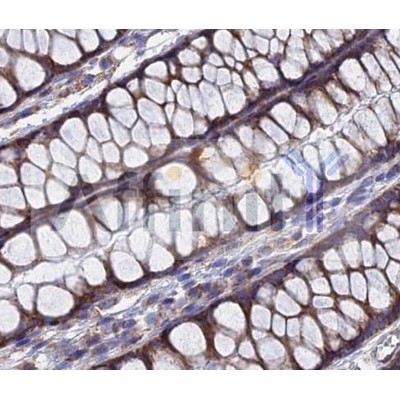TGF alpha Antibody - #AF0262
| Product: | TGF alpha Antibody |
| Catalog: | AF0262 |
| Description: | Rabbit polyclonal antibody to TGF alpha |
| Application: | WB IHC IF/ICC |
| Reactivity: | Human, Mouse, Rat, Monkey |
| Prediction: | Pig, Bovine, Horse |
| Mol.Wt.: | 10kDa; 17kD(Calculated). |
| Uniprot: | P01135 |
| RRID: | AB_2833436 |
Related Downloads
Protocols
Product Info
*The optimal dilutions should be determined by the end user. For optimal experimental results, antibody reuse is not recommended.
*Tips:
WB: For western blot detection of denatured protein samples. IHC: For immunohistochemical detection of paraffin sections (IHC-p) or frozen sections (IHC-f) of tissue samples. IF/ICC: For immunofluorescence detection of cell samples. ELISA(peptide): For ELISA detection of antigenic peptide.
Cite Format: Affinity Biosciences Cat# AF0262, RRID:AB_2833436.
Fold/Unfold
EGF like TGF; EGF-like TGF; ETGF; TFGA; TGF A; TGF type 1; TGF-alpha; Tgfa; TGFA_HUMAN; Transforming growth factor alpha; Transforming growth factor alpha precursor; Wa1; Waved 1;
Immunogens
A synthesized peptide derived from human TGF alpha, corresponding to a region within C-terminal amino acids.
Isoform 1, isoform 3 and isoform 4 are expressed in keratinocytes and tumor-derived cell lines.
- P01135 TGFA_HUMAN:
- Protein BLAST With
- NCBI/
- ExPASy/
- Uniprot
MVPSAGQLALFALGIVLAACQALENSTSPLSADPPVAAAVVSHFNDCPDSHTQFCFHGTCRFLVQEDKPACVCHSGYVGARCEHADLLAVVAASQKKQAITALVVVSIVALAVLIITCVLIHCCQVRKHCEWCRALICRHEKPSALLKGRTACCHSETVV
Predictions
Score>80(red) has high confidence and is suggested to be used for WB detection. *The prediction model is mainly based on the alignment of immunogen sequences, the results are for reference only, not as the basis of quality assurance.
High(score>80) Medium(80>score>50) Low(score<50) No confidence
Research Backgrounds
TGF alpha is a mitogenic polypeptide that is able to bind to the EGF receptor/EGFR and to act synergistically with TGF beta to promote anchorage-independent cell proliferation in soft agar.
Secreted>Extracellular space.
Cell membrane>Single-pass type I membrane protein.
Isoform 1, isoform 3 and isoform 4 are expressed in keratinocytes and tumor-derived cell lines.
Research Fields
· Environmental Information Processing > Signal transduction > MAPK signaling pathway. (View pathway)
· Environmental Information Processing > Signal transduction > ErbB signaling pathway. (View pathway)
· Environmental Information Processing > Signal transduction > Ras signaling pathway. (View pathway)
· Environmental Information Processing > Signal transduction > PI3K-Akt signaling pathway. (View pathway)
· Human Diseases > Drug resistance: Antineoplastic > EGFR tyrosine kinase inhibitor resistance.
· Human Diseases > Cancers: Overview > Pathways in cancer. (View pathway)
· Human Diseases > Cancers: Specific types > Colorectal cancer. (View pathway)
· Human Diseases > Cancers: Specific types > Renal cell carcinoma. (View pathway)
· Human Diseases > Cancers: Specific types > Pancreatic cancer. (View pathway)
· Human Diseases > Cancers: Specific types > Glioma. (View pathway)
· Human Diseases > Cancers: Specific types > Prostate cancer. (View pathway)
· Human Diseases > Cancers: Specific types > Non-small cell lung cancer. (View pathway)
· Human Diseases > Cancers: Specific types > Hepatocellular carcinoma. (View pathway)
· Organismal Systems > Endocrine system > Estrogen signaling pathway. (View pathway)
References
Restrictive clause
Affinity Biosciences tests all products strictly. Citations are provided as a resource for additional applications that have not been validated by Affinity Biosciences. Please choose the appropriate format for each application and consult Materials and Methods sections for additional details about the use of any product in these publications.
For Research Use Only.
Not for use in diagnostic or therapeutic procedures. Not for resale. Not for distribution without written consent. Affinity Biosciences will not be held responsible for patent infringement or other violations that may occur with the use of our products. Affinity Biosciences, Affinity Biosciences Logo and all other trademarks are the property of Affinity Biosciences LTD.


